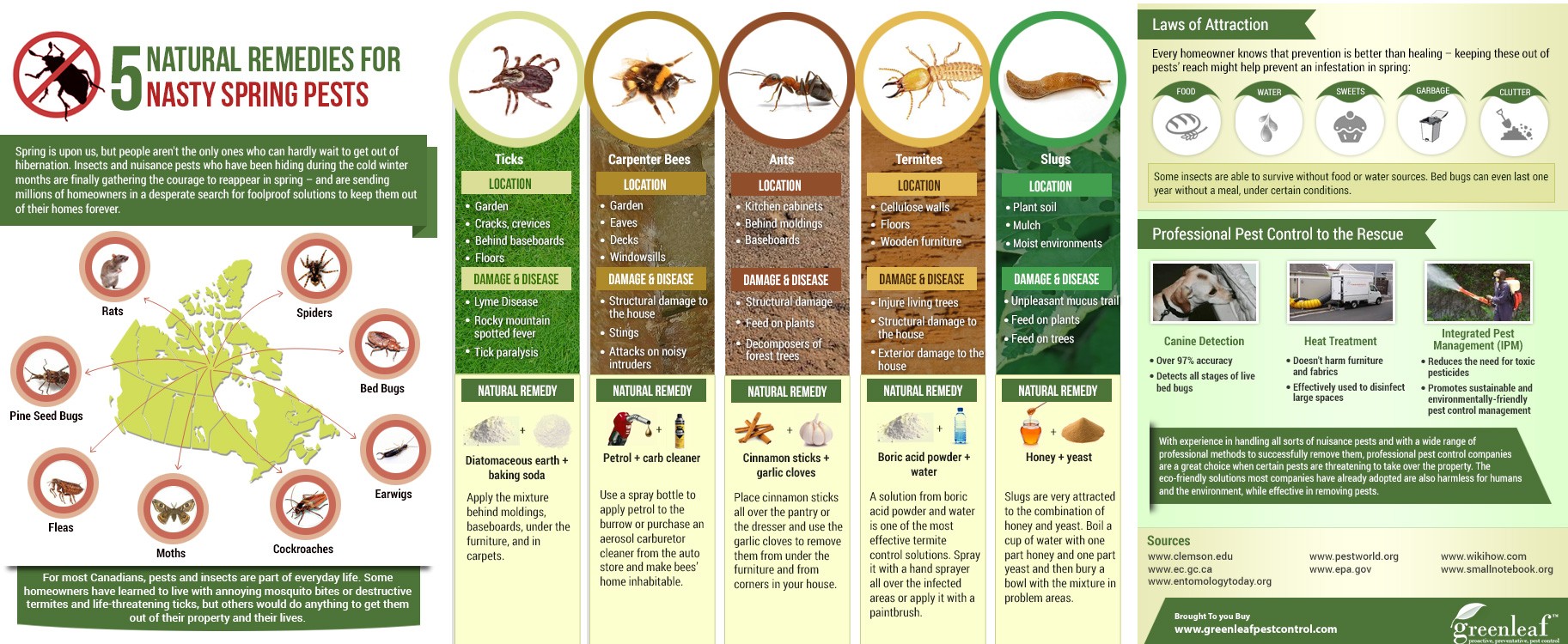Shielding Your Yard From Pests: Methods For A Pest-Free Outdoor Area
Shielding Your Yard From Pests: Methods For A Pest-Free Outdoor Area
Blog Article
Material Composed By-Dunlap Sharma
Picture your garden as a refuge, a location of tranquility and elegance. Nevertheless, https://johnnyfeauo.sharebyblog.com/26509439/from-cockroaches-to-rodents-comprehending-the-top-health-dangers-posed-by-family-vermin of outside insects can promptly interrupt this idyllic photo. Suppose there were easy yet reliable ways to maintain these unwelcome site visitors at bay and safeguard your garden sanctuary? By following best termite killer and carrying out all-natural approaches, you can develop a harmonious exterior space where your plants can thrive uninterrupted.
Natural Parasite Deterrents
To maintain parasites away from your garden normally, plant fragrant natural herbs like mint and lavender. These great smelling plants not just add elegance to your garden however likewise work as effective insect deterrents. Insects like insects, flies, and also some garden-damaging bugs are warded off by the strong aromas produced by these natural herbs. Simply positioning them purposefully around your garden can help create a natural obstacle versus unwanted insects.
Along with bee and wasp removal and lavender, consider growing other natural herbs like rosemary, basil, and lemongrass to better enhance your garden's pest-proofing capacities. These natural herbs not just act as natural repellents however also have the included advantage of serving in cooking or crafting self-made remedies.
Strategic Plant Positioning
Think about the format of your yard and the kinds of plants you need to strategically put them for optimum pest-proofing performance.
Begin by grouping plants with similar resistance to bugs with each other. By doing this, you can develop a natural obstacle that discourages pests from spreading out throughout your garden.
Additionally, placing pest-repelling plants like marigolds, lavender, or mint near even more prone plants can aid safeguard them. High plants, such as sunflowers or corn, can function as a guard for much shorter plants versus bugs like rabbits or ground-dwelling insects.
Keep in mind to leave adequate area between plants to enhance air blood circulation and minimize the risk of conditions that pests may bring.
Furthermore, think about planting strong-smelling natural herbs like rosemary or basil near at risk plants to perplex parasites' senses and make it harder for them to situate their targets.
Effective Bug Control Methods
For combating yard parasites efficiently, applying a multi-faceted parasite control method is necessary. Start by urging natural killers like birds, ladybugs, and hoping mantises to aid maintain insect populaces in check. Presenting plants that bring in these advantageous insects can help in bug control. Furthermore, exercising excellent yard health by getting rid of particles and weeds where bugs might hide can make your yard much less congenial to undesirable visitors.
Think about utilizing physical barriers such as row cover textiles or netting to shield at risk plants from insects like caterpillars and birds. Applying natural pesticides like neem oil or insecticidal soap can likewise be effective against specific parasites while being less harmful to advantageous pests and the setting. It's vital to turn your crops each period to prevent the build-up of insect populations that target specific plants.
Regularly examine your plants for indicators of insect damages so you can take action without delay. By incorporating these techniques and remaining alert, you can effectively control yard parasites and delight in a thriving, pest-free yard.
Final thought
So, there you have it - with the appropriate strategies, you can maintain pesky exterior parasites away from your garden and assist your plants thrive.
Did you recognize that planting mint has been shown to ward off mosquitoes and other bugs, lowering the need for harmful pesticides by as much as 60%?
By incorporating all-natural deterrents and smart growing strategies, you can produce a beautiful and pest-resistant garden sanctuary for you to enjoy.
